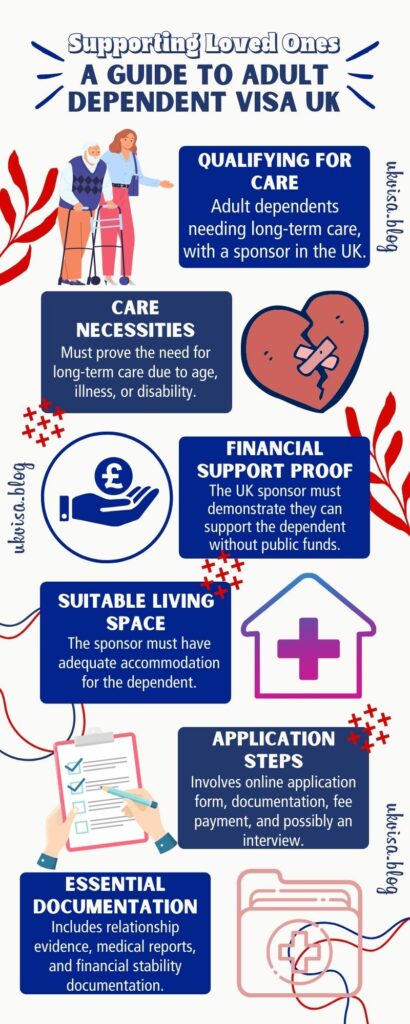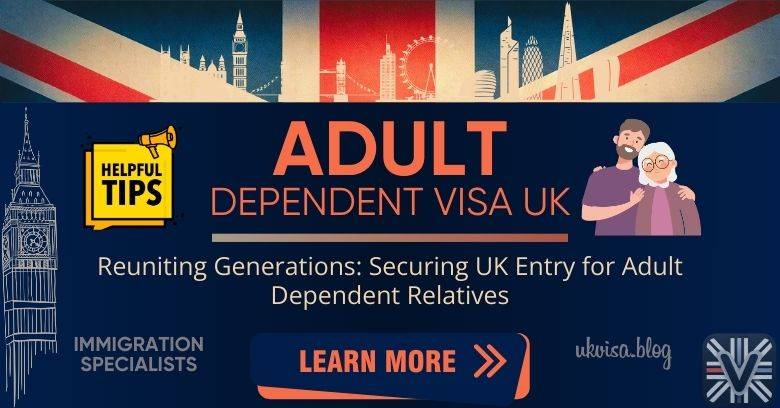UK Adult Dependent Relative Visa: Comprehensive Guide 2024! Applying for a UK Adult Dependent Relative Visa in 2024 requires a thorough understanding of its requirements and process. This guide elucidates the pathway for British citizens or settled residents to bring elderly parents or dependent adult relatives to the UK. It outlines the eligibility criteria, necessary documentation, and step-by-step application procedures. Additionally, it offers insights into common reasons for refusal and practical tips to enhance the likelihood of a successful application. This resource is tailored to help applicants confidently navigate the complexities of the ADR Visa process, ensuring a well-prepared application.
Table of Contents
1. Adult Dependent Relative Visa Requirements
Navigating the UK immigration system for family reunification, especially for elderly parents or other family members, can be complex. The Adult Dependent Relative (ADR) Visa provides a pathway for such reunions under specific conditions.
Eligibility Requirements for Adult Dependent Relative Visa
- Definition:
- The ADR Visa allows adult relatives needing long-term personal care to join family in the UK.
- Eligibility Criteria:
- Applicants must be adult relatives requiring long-term care and have a sponsoring family member in the UK.
- Dependence Demonstration:
- Evidence of long-term care dependency on the UK sponsor is required.
- Sponsor’s Role:
- The UK sponsor must be able to provide care without public funds and be the only available caregiver.
- Financial Requirement:
- The sponsor must prove financial ability to support the applicant without public funds.
- Adequate Accommodation:
- The sponsor must have suitable accommodation for the applicant.
- Maintenance Funds:
- Funds can come from the sponsor, the applicant, or a third-party gift, but not loans or promises.
- Long-term Care Needs:
- Evidence of the need for long-term personal care due to age, illness, or disability is necessary.
- Lack of Home Country Care:
- Applicants must prove the unavailability or unaffordability of care in their home country.
- ECO Assessment:
- The Entry Clearance Officer evaluates the applicant’s care needs and availability of care in the home country.
- Inadequate Home Country Care:
- Consideration of whether care in the home country is reasonable, factoring in various circumstances.
- Additional Information:
- NHS and local authority services are not for non-British relatives who can meet their needs elsewhere.
Alternative Options
For those who cannot meet the ADR visa requirements but require medical treatment, the Private Medical Treatment visa is an alternative pathway.

2. Adult Dependent Visa Supporting Documents
Ensuring you have all the necessary documentation is a critical step in the application process for an Adult Dependent Relative Visa. Below is a detailed breakdown of the types of documents required:
- Proof of Relationship:
- Documents like birth certificates, marriage certificates, or adoption papers to establish the familial relationship with the UK sponsor.
- Evidence of Dependency:
- Financial and care support evidence, including bank statements, money transfer receipts, and support letters, demonstrating dependency on the UK sponsor.
- Medical and Care Needs Documentation:
- Medical reports and healthcare professional assessments outlining the applicant’s long-term care needs due to age, illness, or disability.
- Financial Documents of the Sponsor:
- Evidence of the sponsor’s financial capability to support the applicant, such as payslips, bank statements, and tax returns, without public funds.
- Third-Party Support Documentation:
- If relying on a third party, documents demonstrating this support arrangement are required.
3. How to Apply for Adult Dependent Visa?
Applying for an Adult Dependent Relative Visa involves several key steps, each crucial to ensuring a successful application. Below is a detailed overview of the process:
Adult Dependent Relative Visa Application Process
- Online Application Form:
- Access and complete the application form on the UK government’s website. Answer all questions accurately, ensuring consistency with supporting documents.
- Gathering Supporting Documents:
- Compile crucial documents, including proof of relationship, UK sponsor’s status, financial evidence, accommodation details, medical reports, and care necessity. These documents must substantiate the family relationship, sponsor’s support capacity, and the applicant’s care needs.
- Application Fee Payment:
- Pay the visa application fee (£3,250 as of the latest update). Check for the most current fees and include charges for priority services if chosen. Remember the Immigration Health Surcharge for NHS access.
- Biometrics Appointment:
- Schedule and attend a biometrics appointment at a local visa application center to provide fingerprints and a photograph.
- Processing Times:
- Typically, processing takes about 12 weeks, but this can vary. Priority services may expedite the decision.
- Expect potential delays during peak periods or for complex cases.
- Post-Submission Monitoring:
- After submission and biometrics, keep track of your application’s status. Be responsive to any additional information requests by the UK Visas and Immigration.
4. Common Refusal Reasons
Navigating the Adult Dependent Relative Visa application process can be challenging. Understanding the common reasons for refusal and knowing how to address and avoid them can significantly improve the chances of a successful application.
Reasons for Refusal and How to Address Them
- Reason: Insufficient Documentation
- Ensure all required documents are complete and clear. This includes proof of relationship, dependency evidence, medical and care needs, and financial documents.
- Reason: Failure to Meet Dependency or Care Needs
- Provide substantial evidence of genuine dependency on the UK sponsor and the necessity for long-term care that cannot be accessed in the home country. Include detailed medical documentation and statements from professionals.
- Reason: Inability to Prove Sponsor’s Financial Ability
- The UK sponsor must convincingly demonstrate the financial means to support and care for the applicant without relying on public funds. This can be done through bank statements, income proof, and a clear financial plan.
Application Tips
- Double-check the application form for accuracy and completeness.
- Consult an immigration expert for professional advice, especially if any aspect of the application is unclear.
Conclusion: Maximizing Success in ADR Visa Applications
The Adult Dependent Relative Visa is a critical pathway for UK residents wishing to reunite with elderly parents, siblings, or other adult family members. Meeting the stringent eligibility criteria, which include proving genuine dependency, financial stability, the necessity for long-term care, and the unavailability of suitable care in the home country, is essential.
A well-prepared application significantly increases the chances of success. Understanding the requirements, meticulously preparing documentation, and seeking expert advice are key steps in navigating this complex immigration process. By approaching the application process diligently and comprehensively, applicants can enhance their prospects of reuniting with their loved ones in the UK.
5. FAQs: UK Adult Dependent Relative Visa Requirements 2024
-
What is an Adult Dependent Relative Visa?
It’s a UK visa allowing adult relatives needing long-term care to join their family members in the UK.
-
Who can apply for this visa?
Adult relatives like parents, grandparents, or siblings who require long-term care and have a sponsoring family member in the UK.
-
What are the key requirements for this visa?
Demonstrating long-term care needs, genuine dependency on a UK sponsor, and the sponsor’s financial ability to provide support without public funds.
-
What documents are needed for the application?
Proof of relationship, evidence of dependency and care needs, financial documents of the sponsor, and medical reports.
-
How much does the visa application cost?
The fee is £3,250, subject to changes. Additional fees may apply for priority services.
-
What is the processing time for this visa?
Typically around 12 weeks, but it can vary depending on the complexity of the case and workload at the visa application center.
-
Can I appeal if my application is refused?
Yes, applicants have the right to appeal a refusal, but it’s important to understand the specific reasons for refusal and address them in the appeal.
-
Is it necessary to hire an immigration lawyer?
While not mandatory, consulting with an immigration expert can greatly enhance the chances of a successful application.
This FAQ section is designed to address the most common questions regarding the Adult Dependent Relative Visa, providing clear and concise answers for potential applicants and their families. For further details relating to Adult Dependent Visa please refer Gov.UK Appendix FM Immigration Rules.

